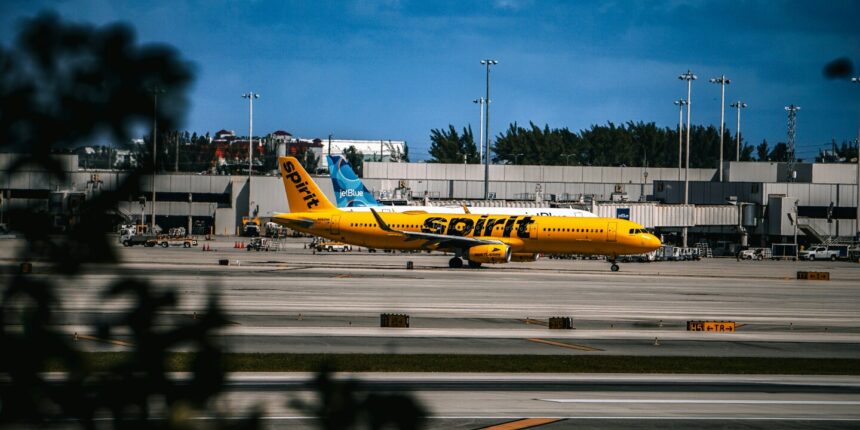Spirit Airlines is embracing the “new year, new me” mindset after announcing this week that it is filing for Chapter 11 bankruptcy. The carrier plans to debut its restructuring plan during the first quarter of 2025; it has signaled that it will be moving away from its traditional budget carrier operating model.
The airline now faces a challenging road ahead as it works to stay in the skies and aims to significantly reduce its debt, as detailed in a letter from CEO Ted Christie shared with loyalty members.
“Spirit has entered into an agreement with our bondholders that is expected to reduce our total debt, provide increased financial flexibility, position Spirit for long-term success, and accelerate investments providing guests with enhanced travel experiences and greater value,” wrote Christie.
While bankruptcy filings can cause concern for travelers, it’s important to know these are not uncommon occurrences in the aviation industry. Here’s everything we know so far and what you can expect from Spirit in the months ahead.
Is Spirit Airlines still flying?
Yes, Spirit Airlines is still flying and is not shutting down operations. Filing for Chapter 11 bankruptcy is the first step in addressing financial challenges, including more than $3 million in long-term debt. The news of Spirit’s bankruptcy filing is not a liquidation (when a company shuts down its operations, or in this case, an airline stops flying), but rather an effort to stabilize the company’s finances, although its future will depend on the success of this restructuring process.
What happens if I have a future Spirit flight already booked?
If you’ve already booked a flight with Spirit Airlines, the company has reassured travelers that operations will continue as normal throughout the bankruptcy process.
“The most important thing to know is that you can continue to book and fly now and in the future,” Christie wrote in the letter to customers.
No flights have been canceled yet, and all flight credits and Spirit frequent flier miles remain valid for future use. However, Spirit customers should monitor their bookings closely: If a flight is scrapped, federal law entitles passengers to a full refund to their original payment method.
However, flights scheduled beyond the restructuring timeline through next spring may face higher risks of disruption, according to Mike Arnot, aviation industry commentator and spokesperson for Cirium, an aviation analytics company.
“Customers flying during the holiday period will not likely be impacted,” said Arnot, adding that what happens from March 2025 and beyond “remains to be seen.” Arnot noted that if there are schedule changes or cancellations, customers should receive plenty of advance notice.
When it comes to ticket prices, Arnot said that Spirit is unlikely to raise its low fares as a short-term solution to tackle its debt.
“The average round-trip fare for Spirit this year is $140 not including taxes and fees and ancillary revenue, slightly higher than Frontier at $136 and Allegiant at $134 according to data from Cirium,” Arnot explained. “I would anticipate the airline will reduce some of its flying more than it already has, but it does not have pricing power to raise its fares on markets.”
What does this mean about the long-term prospects for the airline?
It has been nearly 15 years since a major U.S. airline filed for Chapter 11 bankruptcy: the last instance was American Airlines, which filed right before Thanksgiving in 2011, eventually leading to its merger with US Airways. Such filings are far from unusual in the aviation industry, said Scott Keyes, chief flight expert and founder of Going, an airfare deals app.
“Airlines frequently declare bankruptcy without ceasing operations; major carriers like Delta, United, and American have all done so in the past two decades,” Keyes said.
According to Keyes, Spirit faces three potential futures. Frontier Airlines, a major budget carrier, attempted to merge with Spirit in 2022 and later made more recent efforts to revive the possibility of a union, but negotiations ultimately collapsed again, the Wall Street Journal reported.
“History shows that many mergers happen in bankruptcy, like Delta buying NWA and Pan Am, and American buying TWA,” continued Keyes.
Alternatively, Spirit could emerge from bankruptcy as a leaner but still independent airline. If restructuring efforts fail, the last possibility is that Spirit could cease operations entirely, a scenario that likely wouldn’t unfold until late 2025 or beyond.
What led to Spirit’s financial troubles?
Spirit has built its reputation on ultra-low fares—often cheaper than a bus ticket—while relying heavily on ancillary fees to turn a profit. However, it’s clear that Spirit’s no-frills fare model is no longer resonating with today’s postpandemic travelers, who now expect more value from their base ticket.
Wrote Christie, “We are redefining Spirit as a high-value low-cost carrier, offering a broader array of products including a more premium leisure travel experience at an affordable price. As part of our transformation, we will offer four travel options that all include the flexibility of no change or cancellation fees. We will still offer the quality low-fare products many of our guests prefer, but we will also provide guests the opportunity to choose a premium leisure experience with more space, flexibility, and amenities at an affordable price.”
Spirit has been making significant changes throughout 2024, including introducing new fare bundles with more amenities like Wi-Fi and extra legroom seats.
“The airline industry as a whole is facing significant challenges, including rising operational costs, changing consumer preferences, and fluctuating demand, and we are not immune to them,” Spirit shared on its website dedicated to its restructuring initiative. “To address these headwinds, we have aggressively moved to adapt our business.”
At large, Spirit’s financial struggles stem from a combination of challenges. Increased pilot wages, a costly engine recall impacting much of its fleet, and growing competition from other budget carriers have significantly impacted the airline’s bottom line. Additionally, legacy airlines all offer basic economy fares that rival Spirit’s low prices while providing more amenities, making it harder for Spirit to stand out.










